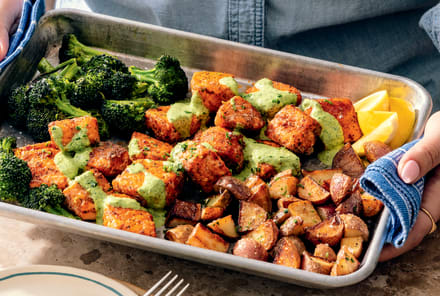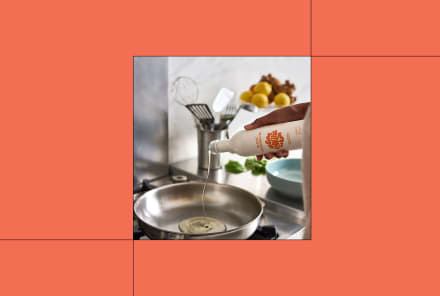Advertisement
These Are The Heart-Healthy Foods You Need To Stock Up On

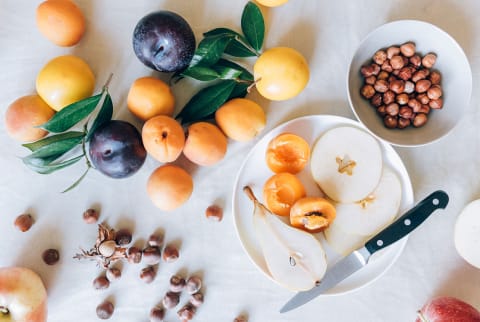
The heart of the Med-DASH plan is plant-based foods: fruits, vegetables, olive oil, beans, nuts, seeds, and mostly whole grains, when you do have grains. Your diet automatically becomes high-fiber and full of antioxidants, vitamins, and minerals. Fortunately, if you consume dairy, meats, poultry, seafood, or beans, they are also rich in vitamins and minerals and high-quality protein. This is a super-nutritious food plan based mostly on whole foods and is very easy to follow. Not just a few super-foods, but a complete super-diet-plan based on great foods.
Beans, nuts, and seeds
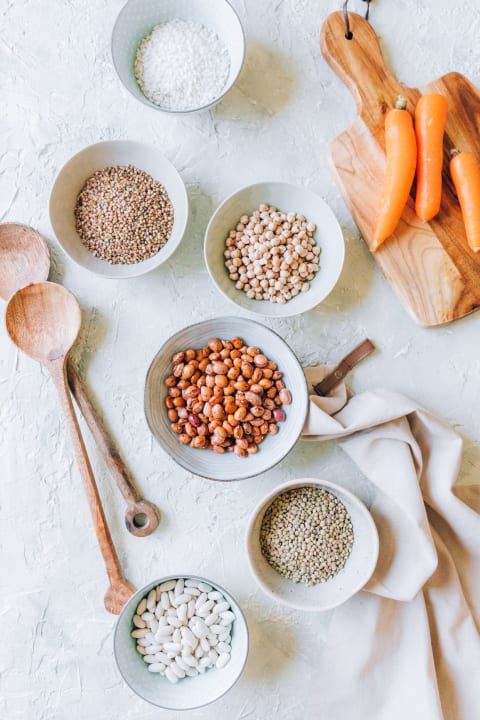
Nuts and seeds should be refrigerated or kept in the freezer to stay fresh because they, too, can become rancid. Yes, they are high in fat. But—surprise!—they are super-nutritious and associated with lower cholesterol and reduced risk of heart attacks. Most nuts are rich in MUFA (monounsaturated fatty acids), as well as fiber, potassium, selenium, and other important minerals, and provide key benefits to both the DASH and Mediterranean diets. They may be particularly advantageous to help reduce the risk of type 2 diabetes, and are anti-inflammatory. Beans, of course, are very high in fiber, which may be protective in terms of supporting a good balance of bacteria in the gut. They are excellent sources of protein, especially for people trying to limit their intake of animal foods.
Lean Meats & Poultry
Beef and pork are much leaner today than they were 25 years ago. We do, however, want to limit our intake of red meat to two or three times per week. Newer information about the digestive end products of meat show that by-products can be formed that can increase your risk of heart disease. One such end product is trimethylamine (TMA), which can be converted to trimethylamine N-oxide (TMAO) in the liver. TMAO is associated with higher risk for cardiovascular disease mortality and may increase the tendency of cholesterol to form plaques in arteries. The process of making TMAO seems to be related to an unhealthy balance of bacteria in your gut. The high amount of plant foods in the Med-DASH plan helps to nourish good bacteria and can minimize production of TMAO and the negative effects of including meat in your diet. The best choices for beef and pork are cuts that have the words "loin," "chop," "chuck," or "round" in their names. These meats are naturally low in saturated fats and calories. You do not need to go super-low-fat with beef since you'll likely end up with tasteless, dry meat that no one will eat. Pork can also be a great choice. It tends to be raised to be much leaner than it was 25 years ago. For this reason, you really want to avoid overcooking pork, which will leave the meat dry and tough. Both beef and pork are great sources of vitamins and minerals. In particular, they are rich in potassium, which appears to be a key part of how the DASH diet helps to lower blood pressure.
Fish and other seafood
The very best fish sources of the beneficial fatty acids DHA and EPA are cold-water fatty ocean fish. Great choices include tuna, mackerel, herring, sardines, halibut, salmon, and anchovies. You may not like all of them, but depending on your personal tastes, I'm sure you will find the right ones to enjoy! If you think you don't like fish, perhaps start with species that taste meatier. I learned to eat fish by trying swordfish, which has a meaty flavor and meaty texture. Then it was on to tuna steaks. Same benefit. Now I love fish, especially salmon.
Just because we specifically want to include fish with omega-3 fats doesn't mean other types of fish and seafood aren't good or should be excluded. Lower-fat fish can also be very healthy, as they are lean, protein-rich foods. You have lots of fabulous choices, including tilapia, whitefish, mahi-mahi, crustaceans like shrimp and lobster, and mollusks like oysters, clams, and scallops.
Fruits and vegetables
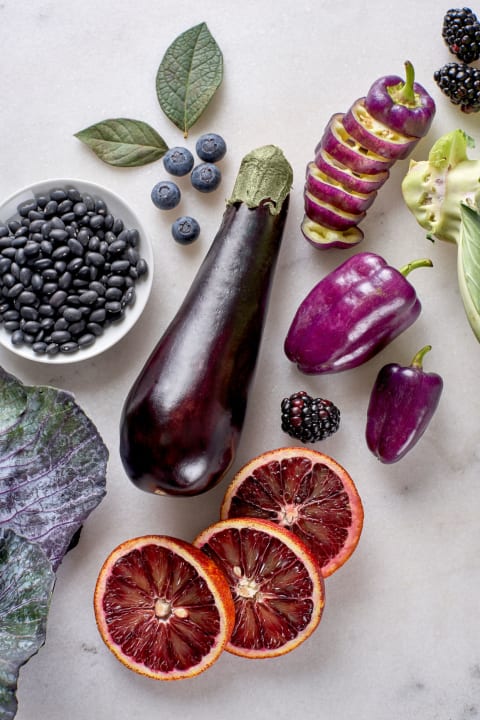
Fruits and vegetables are the core promoters of good health on the Med-DASH plan. They are chock-full of antioxidants, fiber, vitamins, and minerals and can be super delicious, along with having the side benefit of being very filling. The more different colors you choose, the more health benefits you will reap. You can choose fresh, frozen, or canned (preferably fruits in low-sugar syrup, or low-salt vegetables), if that fits better into your budget. Berries are especially wonderful. Those intense reds and blues are associated with the very powerful antioxidant anthocyanin. Stone fruits (peaches, plums, apricots, cherries, pluots) are very rich in soluble fiber, which slows your absorption of fructose (the fruit sugar) and nourishes good bacteria in your gut; these fruits also contain anthocyanin. Citrus fruits are rich in carotenoids, along with vitamin C.
As mentioned earlier, grapefruit can react with some medications in your body, so talk to your physician to see if you should limit grapefruit in your diet. Even though we don't want to overdo them, both sweet potatoes and regular potatoes are rich in potassium and vitamin C. Orange-yellow fruits and vegetables have lots of beta-carotene, along with other powerful antioxidants. Green leafy vegetables also contain lots of carotenoids, although they are hidden by green chlorophyll. Tomatoes, red bell peppers, and watermelon are rich in lycopene.
Dairy
Dairy is important for providing all the blood pressure benefits of the DASH diet. In general, we would like to mostly choose nonfat or reduced-fat dairy. You may think this runs contrary to the "keep the fat in the diet" message of the Med-DASH plan. However, we do want to limit saturated fats, which are associated not only with heart-health concerns but also increased risk for insulin resistance (a precursor to type 2 diabetes), perhaps lower bone density in women, and some kinds of cancer, including prostate cancer. (It should be noted that for men, intake of two or more cups of milk per day is associated with an increased risk for prostate cancer, so lower intake may be beneficial.) Calcium and magnesium also reduce the absorption of saturated fats.
Fermented dairy foods, whether Greek yogurt or mozzarella cheese, are very familiar parts of the Mediterranean diet and are easy for most people to digest. The lactose in yogurt or cheese is converted into lactic acid, which is what provides the thickening. The straining process that concentrates Greek yogurt reduces its lactose content even further. Many people even find that their tolerance for dairy improves if they consume more yogurt. In cheese-making, almost all residual lactose gets removed when the liquid whey portion is separated from the solid curds. There are so many important nutrients, such as high-quality protein, calcium, potassium, magnesium, and vitamin D, in dairy foods, so please include them if they agree with you.
Chocolate
Chocolate is super-rich in antioxidant polyphenols. Studies in several countries have shown that people who have a cup of hot chocolate daily are less likely to have issues with heart disease and blood pressure. Observational studies of people all over the world, including in the United States, Sweden, Holland, the Kuna Indians in Panama, and elsewhere, have shown cardioprotective benefits for people who have moderate chocolate intake. Polyphenol-rich chocolate has been shown to lower blood pressure, improve vascular function, have a vasodilatory effect, reduce oxidative stress, increase mitochondrial function (associated with the capacity to burn off excess energy), reduce platelet stickiness (associated with blood clots), and improve the ability to respond to insulin and metabolize glucose properly. Choose mostly really good dark chocolate, in smallish portions, and enjoy!
Watch Next
Enjoy some of our favorite clips from classes
Enjoy some of our favorite clips from classes
What Is Meditation?
Mindfulness/Spirituality | Light Watkins
Box Breathing
Mindfulness/Spirituality | Gwen Dittmar
What Breathwork Can Address
Mindfulness/Spirituality | Gwen Dittmar
The 8 Limbs of Yoga - What is Asana?
Yoga | Caley Alyssa
Two Standing Postures to Open Up Tight Hips
Yoga | Caley Alyssa
How Plants Can Optimize Athletic Performance
Nutrition | Rich Roll
What to Eat Before a Workout
Nutrition | Rich Roll
How Ayurveda Helps Us Navigate Modern Life
Nutrition | Sahara Rose
Messages About Love & Relationships
Love & Relationships | Esther Perel
Love Languages
Love & Relationships | Esther Perel
What Is Meditation?
Box Breathing
What Breathwork Can Address
The 8 Limbs of Yoga - What is Asana?
Two Standing Postures to Open Up Tight Hips
How Plants Can Optimize Athletic Performance
What to Eat Before a Workout
How Ayurveda Helps Us Navigate Modern Life
Messages About Love & Relationships
Love Languages
Advertisement
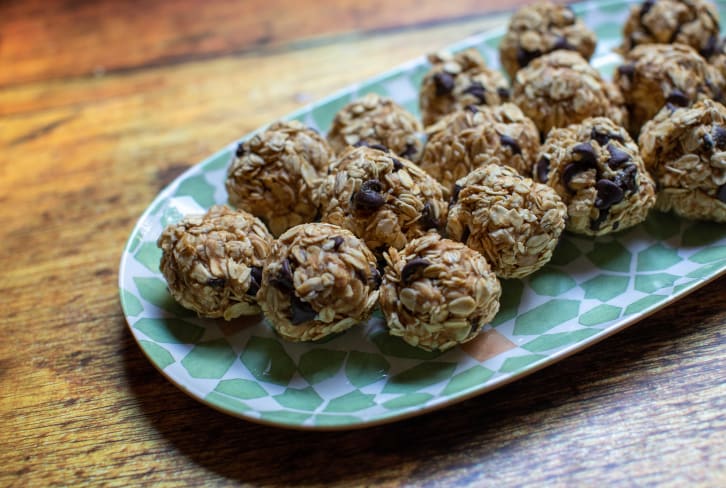
These Peanut Butter Cup Protein Bites Make The Perfect On-The-Go Snack
Molly Knudsen, M.S., RDN



